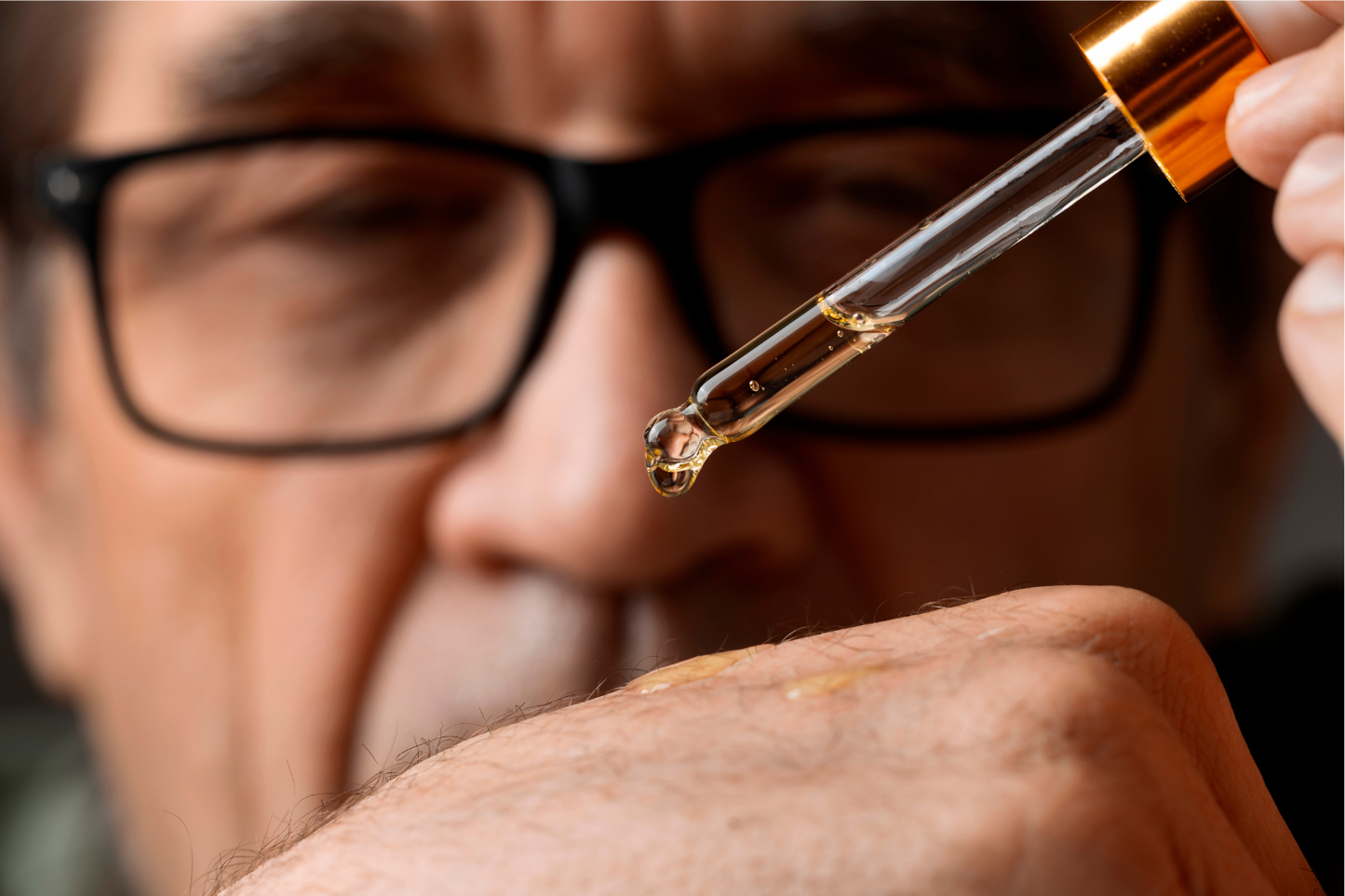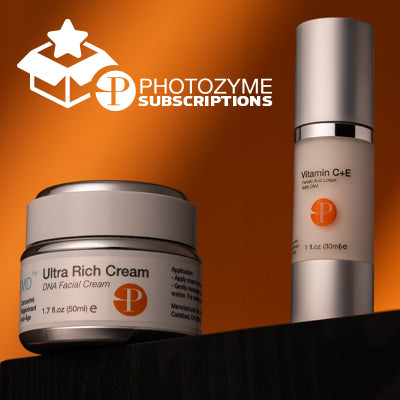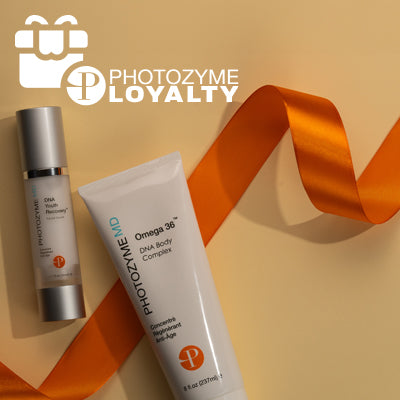
Find the best retinol products recommended by dermatologists for youthful skin. Feel true anti-aging results with clinically-proven solutions today!
Key Takeaways:
- Unlock Dermatologist-Approved Skincare Solutions: Discover the transformative power of dermatologist-approved retinol products to enhance your skincare routine with clinically backed solutions.
- Choosing The Right Retinol For Your Skin: Learn to select the right retinol formulation for your skin type and safely combine it with other skincare ingredients for optimal results.
- Retinol Myths Debunked: Debunk common retinol myths and understand its role in anti-aging, supported by dermatologists and scientific research, to achieve radiant skin.
At Photozyme, we deliver more than skincare—we deliver transformation. Our products are powered by proprietary DNA repair enzyme technology, crafted precisely, and trusted by dermatologists worldwide. Backed by clinical research, each formula is designed to repair, protect, and rejuvenate your skin at the cellular level. With Photozyme, science is not just a promise—it’s a proven pathway to healthier, youthful skin.
Not all retinol products are created equal for real anti-aging results. Finding the best retinol products recommended by dermatologists ensures you’re using formulations backed by science, safety, and proven performance. These trusted solutions combine powerful active ingredients with advanced delivery systems to maximize results without unnecessary irritation, giving your skin the right tools for smoother texture, even tone, and long-term resilience.
In this article, we will explore what makes the best retinol products recommended by dermatologists, how to choose the right one for your skin type, and why scientifically-backed formulas are essential for achieving visible, lasting anti-aging results.
What Is Retinol And How Does It Benefit Your Skin?
Retinol, a vitamin A derivative, is revered in dermatology circles for its formidable anti-aging and skin-renewing properties. It is a crucial component in skin care regimens, owing to its scientifically backed ability to transform your skin’s appearance.
But what exactly is retinol, and how does it work its magic?
How Retinol Works Beneath The Surface
Retinol penetrates deep into the skin layers to accelerate cell turnover. This means it helps your skin shed old, dead cells, making way for fresher, healthier cells. Increased cell turnover is fundamental in reducing the appearance of fine lines and wrinkles, thus promoting a smoother skin texture. Furthermore, retinol stimulates collagen production, a protein essential for maintaining skin elasticity and firmness. Choosing the best retinol cream for wrinkles can significantly enhance these effects, helping you improve skin firmness and smoothness.
Brightening Skin Tone And Reducing Hyperpigmentation
Backed by clinical studies, retinol has also been shown to address uneven skin tone and hyperpigmentation issues. Its exfoliating action unearths brighter, more youthful skin hidden beneath the surface and assists in diminishing stubborn sunspots and age spots over time.
Versatility Across Different Skin Types
One notable advantage of retinol is its versatility—it can benefit various skin types, with many formulations available to suit sensitive skin. For those concerned about initial irritation, dermatologists often recommend starting with a lower concentration of retinol and gradually increasing tolerance to more potent formulations as the skin adapts.
The Long-Term Benefits Of Retinol
Incorporating retinol into your routine can deliver powerful long-term results, offering lasting skin integrity and appearance preservation. But as with any effective dermatological ingredient, understanding retinol’s action on your skin is the first step towards its successful application in your quest for optimal skin health.
Top Dermatologist-Approved Retinol Products You Need To Try
When it comes to achieving youthful, radiant skin, retinol stands out as a potent, dermatologist-approved ingredient.
Let’s highlight some of the top retinol products backed by clinical research and scientific innovation.
1. GFS Plus Night Serum With 0.5% Retinol
Formulated with 0.5% retinol and DNA repair enzymes, this night serum helps support cellular regeneration while improving skin tone and texture. It targets early signs of aging, promotes collagen production, and addresses pigmentation caused by sun exposure, making it a balanced choice for strengthening skin overnight without excessive irritation.
2. DNA Youth Recovery Facial Serum
Our facial serum combines DNA repair enzymes with potent antioxidants to reinforce skin recovery at a cellular level. It assists in repairing UV-induced damage, improves elasticity, and reduces the appearance of fine lines and pigmentation irregularities. Its lightweight formula makes it an ideal foundational product for daily skin rejuvenation.
3. Ultra Rich DNA Facial Cream
This ultra-rich cream blends DNA repair enzymes with essential moisturizers for deep hydration and cellular repair. It strengthens the skin barrier, supports collagen health, and visibly improves firmness and smoothness. It is ideal for mature or dehydrated skin and enhances overall skin resilience against daily environmental stressors.
4. Omega 36 Body Complex
This body treatment targets more than surface hydration—it supports skin restoration across larger areas prone to sun damage. Enriched with DNA repair enzymes and omega fatty acids, it improves skin elasticity and smooths roughness. It helps diminish the appearance of age spots, providing full-body nourishment and anti-aging defense.
Selecting the right retinol product can significantly impact your skin's health and appearance. Each product listed here is a testament to the power of science and clinical research in the ongoing quest for age-defying skin.
How To Choose The Right Retinol For Your Skin Type
Selecting the right retinol product is a nuanced process, guided by your specific skin type and individual concerns. For optimal results, it’s crucial to understand how different formulations may interact with your skin.
Here's a guide to help you navigate the options.
Understanding Your Skin Type
- Oily Skin: If you're prone to excess oil and shine, look for a non-comedogenic retinol formula to prevent clogged pores. Products that include salicylic acid can help manage oil production and reduce the potential for breakouts.
- Dry Or Sensitive Skin: To minimize irritation, sensitive or dry skin should gravitate towards gentle, low-strength retinol products. Look for the best retinol for sensitive skin formulations enriched with hydrating agents such as hyaluronic acid and ceramides to support the skin barrier while delivering the efficacy of retinol.
- Combination Skin: Balancing your retinol use is essential for both oily and dry areas. Consider a medium-strength product and focus its application on areas of concern like the T-zone while moisturizing the drier parts with a nourishing cream.
Evaluating Ingredients
While the percentage of retinol is vital, the accompanying ingredients can enhance or detract from its efficacy. Antioxidants such as vitamins C and E are excellent complements, offering additional protection against free radicals. Peptides in a formulation can also help firm the skin and reduce the appearance of fine lines.
Frequency And Timing
Introducing retinol into your routine should be gradual, particularly for first-time users or sensitive skin types. Start with a lower concentration, applying it every two to three nights to assess your skin’s tolerance. As your skin adjusts, you can increase the frequency and concentration as your dermatologist recommends.
Packaging And Storage
Exposure to air and light can compromise retinol's efficacy. Opt for products housed in opaque, airtight containers. Store your retinol in a cool, dark place to maintain its stability and potency over time.
Common Myths About Retinol—Debunked
Regarding skincare, retinol is often shrouded in myths and misconceptions that can lead astray even the most informed individuals.
We’ll break down some myths here, clarifying this impactful ingredient.
Myth 1: Retinol Thins The Skin
One of the most prevalent myths is that retinol thins the skin. In reality, retinol enhances skin thickness. It works by promoting cell turnover and boosting collagen production. Clinical studies have shown that consistent retinol use increases epidermal thickness, helping to fortify the skin's structural integrity and resulting in a more resilient and youthful appearance. Understanding the face aging timeline also highlights why collagen support is crucial for maintaining skin vitality over the years.
Myth 2: Retinol Is Only For Aging Skin
Retinol isn’t just reserved for those battling the signs of aging. While its ability to reduce fine lines and wrinkles is well-documented, retinol is also a powerhouse for treating acne and improving skin texture. It balances sebum production and clears clogged pores, making it a multifaceted treatment suitable for various skin concerns, regardless of age.
Myth 3: Retinol Exfoliates The Skin
Contrary to common belief, retinol does not exfoliate the skin in the traditional sense. While exfoliating agents like alpha and beta hydroxy acids actively remove dead skin cells from the surface, retinol works at the cellular level. Encouraging faster skin cell turnover streamlines how skin renews itself, enhancing clarity and tone without the abrasive effects of physical or chemical exfoliants.
Myth 4: More Retinol Means Better Results
It’s easy to fall into the trap of thinking that higher concentrations of retinol will yield faster or better results, but this is far from true. Using excessive amounts can lead to irritation rather than improvement. It is crucial to gradually introduce retinol into your routine, allowing your skin time to build tolerance and ensuring sustained benefits without adverse effects. Adhering to dermatologist guidelines on retinol usage will facilitate optimal skin health and balance.
Myth 5: Retinol Cannot Be Used During The Daytime
While retinol can increase skin sensitivity to UV rays, it is not strictly a nocturnal treatment. Retinol can be safely included in your morning routine when paired correctly with broad-spectrum sunscreen. Dermatologists emphasize the importance of protective measures to harness retinol’s advantages without compromising skin safety during daylight exposure.
Tips For Using Retinol With Sensitive Skin
Navigating retinol when your skin is sensitive can be challenging, but it is manageable with the right approach.
Here are some dermatologist-backed tips to help you incorporate retinol into your regimen while keeping irritation at bay.
- Start Slow: Gradually introduce retinol into your skincare routine. Use it once or twice weekly, allowing your skin to acclimate to its powerful effects. This gradual introduction minimizes the potential for irritation. Selecting the best retinol for beginners can make this transition even easier, offering formulations designed to be gentle yet effective.
- Choose The Right Formula: Opt for retinol products specifically designed for sensitive skin, often marked as 'low-strength' or containing soothing ingredients. Such formulations help balance the active properties of retinol with calming agents that reduce inflammation.
- Apply Moisturizer First: For those with heightened sensitivity, consider applying a moisturizer before retinol. This creates a buffer and helps mitigate direct contact between the retinol and your skin, reducing the likelihood of irritation.
- Avoid Concurrent Exfoliation: Exfoliating products alongside retinol can be too harsh and lead to unnecessary irritation. Alternating exfoliation days with retinol application is advisable to maintain skin health without overloading it.
- Prioritize Sun Protection: Retinol can increase skin sensitivity to the sun. A broad-spectrum sunscreen with at least SPF 30 daily protects your skin from UV damage, especially if you’re incorporating retinol into your routine.
- Monitor Your Skin’s Response: As with any active ingredient, it's vital to monitor how your skin reacts. If you experience persistent redness or peeling, consider reducing the frequency of use or consulting your dermatologist for personalized advice.
Integrating these tips will help maintain your skin’s integrity while reaping the benefits of retinol's remarkable anti-aging properties.
Final Thoughts
Understanding the science behind skincare is paramount for youthful, radiant skin. Dermatologist-approved retinol products stand as a cornerstone in the fight against aging, thanks to their proven ability to restore, rejuvenate, and revitalize skin clarity and texture.
At Photozyme, we’re committed to providing skincare professionals and their patients with access to products rooted in rigorous scientific research. Our dedication to utilizing innovative components such as proprietary DNA repair enzymes ensures that you are equipped with solutions that address the very foundation of skin aging. For those seeking a consistent and optimized regimen, our retinol subscription service ensures you never miss a step in maintaining your skin’s health, delivering dermatologist-trusted formulations directly to your door for maximum results.
Try skincare with Photozyme, where innovation meets proven efficacy.
Read also:
- Your Face-Aging Timeline: What To Expect And How To Fight It
- Top Skincare Trends Everyone Is Talking About Right Now
- Simple Habits That Lead To Radiant And Healthy Skin
Frequently Asked Questions About Best Retinol Products Recommended By Dermatologists
Is retinol safe for all skin types?
Retinol suits most skin types, but people with sensitive skin should approach it cautiously. Always patch-test any new product and consult a dermatologist to tailor the application to your skin’s unique needs.
Should I use retinol during the day or at night?
It's advised to use retinol at night. Sunlight can degrade retinol, reducing its effectiveness and increasing skin photosensitivity, making night-time application ideal to ensure optimal results.
How long does it take to see results from retinol?
Visible improvements with retinol can generally be expected within 8 to 12 weeks of consistent use. This period allows retinol to effectively enhance cellular turnover and collagen production, addressing fine lines and pigmentation concerns.
Can I use retinol if I have sensitive skin?
Individuals with sensitive skin should exercise caution when using retinol. Consider starting with a lower concentration and mixing it with a moisturizer initially. Consulting a dermatologist to formulate a personalized approach is strongly recommended.
At what age should I start using retinol?
Retinol can be beneficial from mid-20s onward, particularly as a preventive measure against premature aging. Starting early, as part of a comprehensive skincare regimen, can help maintain skin elasticity and manage minor signs of aging.
What concentration of retinol is best for beginners?
Beginners should look for retinol concentrations around 0.25% to 0.5%. This provides an effective introduction to its benefits while minimizing potential irritation. Gradually increasing the concentration as your skin builds tolerance can enhance the anti-aging effects.





